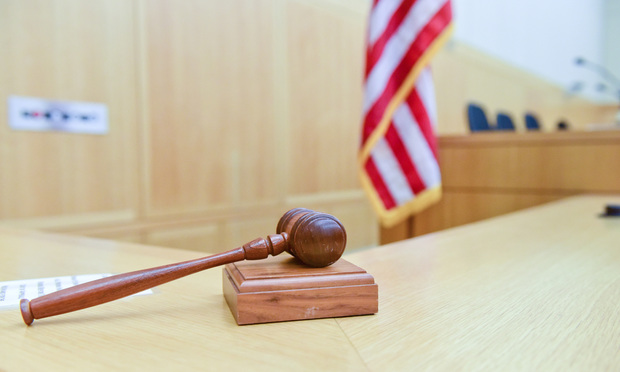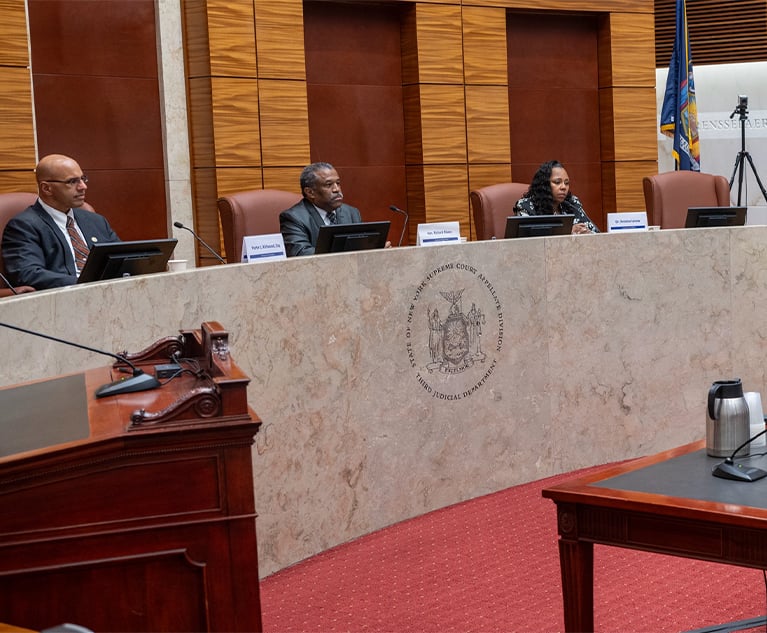Suspended NY Judge's Lawsuit Against OCA Officials Allowed to Continue by Federal Judge
The decision will allow Justice Elizabeth Shollenberger to pursue damages after officials at the Office of Court Administration allegedly discriminated against her because of her several disabilities.
June 28, 2019 at 04:16 PM
6 minute read
 Photo: David Handschuh/NYLJ
Photo: David Handschuh/NYLJ
A discrimination lawsuit brought against Chief Judge Janet DiFiore and Chief Administrative Judge Lawrence Marks by a now-suspended city court justice from White Plains will be allowed to continue, a federal judge ruled Friday.
The decision will allow Justice Elizabeth Shollenberger to pursue damages after officials at the Office of Court Administration allegedly discriminated against her because of her several disabilities.
U.S. District Judge Vincent Briccetti said in the decision that Shollenberger had presented a case that could be argued in court and disagreed with the various reasons for which state court officials had said the litigation should be thrown out.
Anthony Consiglio, an associate at Cary Kane in Manhattan, said they were ready to press forward with the lawsuit.
“We appreciate Judge Briccetti's quick ruling on this motion, which now allows us to move forward with all discovery and depositions in the case without any delay,” Consiglio said.
A spokesman from the Office of Court Administration said they're ready for the challenge.
“We, too, look forward to discovery and depositions and presenting our case to the Court,” said Lucian Chalfen, a spokesman for OCA.
Shollenberger was twice-suspended from serving on the White Plains City Court in less than three years for various reasons, the first of which involved her using a courtroom trash can to relieve herself. But her claims go well beyond the trash can incident.
Her lawsuit alleged that the state court system failed to provide, at least temporarily, several accommodations for her disabilities, including handrails in courtrooms where she worked and the bathroom nearest to her chambers. She claimed she presided in the courtroom from a table set up on the floor.
Shollenberger has several disabilities that obstruct her movement, including chronic obstructive pulmonary disease, swelling in her legs, and obesity, among other issues. To treat her disabilities, Shollenberger has to take medications that put stress on her body, “requiring her to have quick access to the restroom,” according to the suit.
Those medical issues have taken a toll on her time at work. During the first four months she was on the bench, Shollenberger was hospitalized three times. She took sick leave for 36 days of that time.
The trash can incident happened five months after she started on the bench. She was suspended by Marks the next day. That was followed by a pattern of behavior from state court officials that blocked her from returning to work, Shollenberger claimed.
The suspension lasted more than a year, during which Shollenberger received full pay and benefits. But she also claimed she was asked to jump through hoops before she was allowed to return. State court officials allegedly asked for her medical records for the first eight months of 2017, for example.
Shollberger also claimed she was asked to undergo two medical exams, a visit with a pulmonary specialist, and two psychiatric exams. State court officials allegedly chose which doctors she went to for those exams. She cleared all of them.
That took longer than expected for a few reasons, Shollenberger claimed. One of the exams was rescheduled five months after it was originally supposed to happen, she said. The pulmonary specialist she was allegedly asked to go to was also in Nassau County, well away from Westchester.
She finally sat for a two-hour interview with the Office of the Inspector General, after which she was reinstated in July 2018. That didn't last long.
One month after her suspension ended, court employees had allegedly complained about “unpleasant and offensive odors,” according to the decision. Shollenberger said those smells could have come from discarded bandages used to cover up an infection on her leg, which was one of her disabilities.
She had claimed that court officials previously agreed to provide odor-free waste receptacles for her bandages, but said those never showed up. She was suspended again by Marks within hours of having a conversation with an administrative judge about the alleged odors.
She filed suit last October against DiFiore, Marks and the Unified Court System over what she claimed were violations of the federal Americans with Disabilities Act, the New York State Human Rights Law, and a section of the executive law.
The state had moved to dismiss those claims in a previous filing, but Briccetti rejected their arguments Friday.
DiFiore and Marks had argued that, because they did not personally violate Shollenberger's rights, the ADA claims against them should be dismissed. They weren't involved in decisions about hand railings and bathrooms in the court, for example. Briccetti disagreed with their argument.
“They argue plaintiff fails to allege Chief Judge DiFiore and Judge Marks violated plaintiff's rights under the ADA by personally discriminating, interfering, or retaliating against plaintiff,” Briccetti wrote. “However, they do not point to a single case—and the Court is aware of none—that requires a plaintiff to allege anything more than that a defendant sued in his or her official capacity for injunctive relief had the authority to control and correct the alleged violation.”
Shollenberger's claims that state court officials also violated parts of the state Human Rights Law were also allowed to stand. She had said she was retaliated against and forced to work in a hostile work environment. Her lawsuit claimed that she tried to address those concerns with Marks and other state court officials but was rebuffed.
“Moreover, plaintiff offers facts suggesting that despite knowing of the harassment, Judge Marks refused plaintiff's repeated requests to have a discussion and refused to restrain court employees from making public remarks about her,” Briccetti wrote.
Her claims that she was forced to undergo several exams before returning to work could be used to argue that she was the subject of retaliation, Briccetti wrote.
The litigation will now continue in federal court. State court officials are scheduled to file an answer to the lawsuit in July.
READ MORE:
New York Legislature Authorizes 4 More Justices in NYC, Upstate
NY Sees Progress on Court Backlog as 'Excellence Initiative' Enters Fourth Year
DiFiore Renews Call for Lawmakers to Restructure NY Court System
This content has been archived. It is available through our partners, LexisNexis® and Bloomberg Law.
To view this content, please continue to their sites.
Not a Lexis Subscriber?
Subscribe Now
Not a Bloomberg Law Subscriber?
Subscribe Now
NOT FOR REPRINT
© 2025 ALM Global, LLC, All Rights Reserved. Request academic re-use from www.copyright.com. All other uses, submit a request to [email protected]. For more information visit Asset & Logo Licensing.
You Might Like
View All

Law Firms Expand Scope of Immigration Expertise Amid Blitz of Trump Orders
6 minute read
'Reluctant to Trust'?: NY Courts Continue to Grapple With Complexities of Jury Diversity
Trending Stories
- 1An Eye on ‘De-Risking’: Chewing on Hot Topics in Litigation Funding With Jeffery Lula of GLS Capital
- 2Arguing Class Actions: With Friends Like These...
- 3How Some Elite Law Firms Are Growing Equity Partner Ranks Faster Than Others
- 4Fried Frank Partner Leaves for Paul Hastings to Start Tech Transactions Practice
- 5Stradley Ronon Welcomes Insurance Team From Mintz
Who Got The Work
J. Brugh Lower of Gibbons has entered an appearance for industrial equipment supplier Devco Corporation in a pending trademark infringement lawsuit. The suit, accusing the defendant of selling knock-off Graco products, was filed Dec. 18 in New Jersey District Court by Rivkin Radler on behalf of Graco Inc. and Graco Minnesota. The case, assigned to U.S. District Judge Zahid N. Quraishi, is 3:24-cv-11294, Graco Inc. et al v. Devco Corporation.
Who Got The Work
Rebecca Maller-Stein and Kent A. Yalowitz of Arnold & Porter Kaye Scholer have entered their appearances for Hanaco Venture Capital and its executives, Lior Prosor and David Frankel, in a pending securities lawsuit. The action, filed on Dec. 24 in New York Southern District Court by Zell, Aron & Co. on behalf of Goldeneye Advisors, accuses the defendants of negligently and fraudulently managing the plaintiff's $1 million investment. The case, assigned to U.S. District Judge Vernon S. Broderick, is 1:24-cv-09918, Goldeneye Advisors, LLC v. Hanaco Venture Capital, Ltd. et al.
Who Got The Work
Attorneys from A&O Shearman has stepped in as defense counsel for Toronto-Dominion Bank and other defendants in a pending securities class action. The suit, filed Dec. 11 in New York Southern District Court by Bleichmar Fonti & Auld, accuses the defendants of concealing the bank's 'pervasive' deficiencies in regards to its compliance with the Bank Secrecy Act and the quality of its anti-money laundering controls. The case, assigned to U.S. District Judge Arun Subramanian, is 1:24-cv-09445, Gonzalez v. The Toronto-Dominion Bank et al.
Who Got The Work
Crown Castle International, a Pennsylvania company providing shared communications infrastructure, has turned to Luke D. Wolf of Gordon Rees Scully Mansukhani to fend off a pending breach-of-contract lawsuit. The court action, filed Nov. 25 in Michigan Eastern District Court by Hooper Hathaway PC on behalf of The Town Residences LLC, accuses Crown Castle of failing to transfer approximately $30,000 in utility payments from T-Mobile in breach of a roof-top lease and assignment agreement. The case, assigned to U.S. District Judge Susan K. Declercq, is 2:24-cv-13131, The Town Residences LLC v. T-Mobile US, Inc. et al.
Who Got The Work
Wilfred P. Coronato and Daniel M. Schwartz of McCarter & English have stepped in as defense counsel to Electrolux Home Products Inc. in a pending product liability lawsuit. The court action, filed Nov. 26 in New York Eastern District Court by Poulos Lopiccolo PC and Nagel Rice LLP on behalf of David Stern, alleges that the defendant's refrigerators’ drawers and shelving repeatedly break and fall apart within months after purchase. The case, assigned to U.S. District Judge Joan M. Azrack, is 2:24-cv-08204, Stern v. Electrolux Home Products, Inc.
Featured Firms
Law Offices of Gary Martin Hays & Associates, P.C.
(470) 294-1674
Law Offices of Mark E. Salomone
(857) 444-6468
Smith & Hassler
(713) 739-1250







